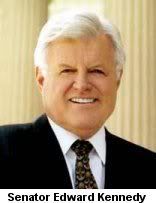Tuesday, January 09, 2007
Kennedy: "Iraq is George Bush’s Vietnam"
 In a speech before the National Press Club today, Senator Ted Kennedy (D-MA) ripped George W. Bush's forthcoming proposal to escalate America's involvement in Iraq and announced legislation that would neuter Bush's ability to do that without Congressional approval.
In a speech before the National Press Club today, Senator Ted Kennedy (D-MA) ripped George W. Bush's forthcoming proposal to escalate America's involvement in Iraq and announced legislation that would neuter Bush's ability to do that without Congressional approval."As the election in November made clear, the vast majority of Americans oppose the war in Iraq, and an even greater number oppose sending even more troops to Iraq today," said Kennedy. "The President is Commander-in-Chief, but in our democracy he is still accountable to the people. Our system of checks and balances gives Congress – as the elected representatives of the people – a central role in decisions on war and peace."
Kennedy then announced his legislation which would not cut funding for active military already in Iraq, but that would require the Congress to vote before Bush can escalate troop levels in Iraq.
"Today, I am introducing legislation to reclaim the rightful role of Congress and the people’s right to a full voice in the President’s plan to send more troops to Iraq," said the Massachusetts Senator. "Congressman Ed Markey of Massachusetts will introduce similar legislation in the House of Representatives. Our bill will say that no additional troops can be sent and no additional dollars can be spent on such an escalation, unless and until Congress approves the President’s plan."
Kennedy cited Article I, section 8 of the Constitution, saying it gives Congress the authority to fund all military action and to demand answers and justification from the White House before it approves funding for any presidential military initiatives.
"Until now, a rubber stamp Republican Congress has refused to hold the White House accountable on Iraq. But the November election has dramatically changed all that," Kennedy said.
The speech then took a dramatic turn, with Kennedy quoting Lyndon B. Johnson talking with resolve about Vietnam and it sounding remarkably like George W. Bush today:
“It became clear that if we were prepared to stay the course, we could help to lay the cornerstone for a diverse and independent Asia… If we faltered, the forces of chaos would scent victory and decades of strife and aggression would stretch endlessly before us. The choice was clear. We would stay the course. And we shall stay the course.""That is not President Bush speaking. It is President Lyndon Johnson, forty years ago, ordering a hundred thousand more American soldiers to Vietnam," said Kennedy.
"Those comparisons from history resonate painfully in today’s debate on Iraq. In Vietnam, the White House grew increasingly obsessed with victory, and increasingly divorced from the will of the people and any rational policy. The Department of Defense kept assuring us that each new escalation in Vietnam would be the last. Instead, each one led only to the next.
"Echoes of that disaster are all around us today. Iraq is George Bush’s Vietnam."
Kennedy also quoted military leaders who have advised against further troops in Iraq including General John Abizaid who said, in speaking to the Senate Armed Services Committee in November, “I believe that more American forces prevent the Iraqis from doing more and from taking more responsibility for their own future.”
And, as is true with the massive change in priorities taking place in Washington in just the last week, Kennedy's speech sent the overall message that the change voted on by the American people in November, will be realized.
"We campaigned as Democrats in 2006," said Kennedy. "And we must govern as Democrats in 2007."